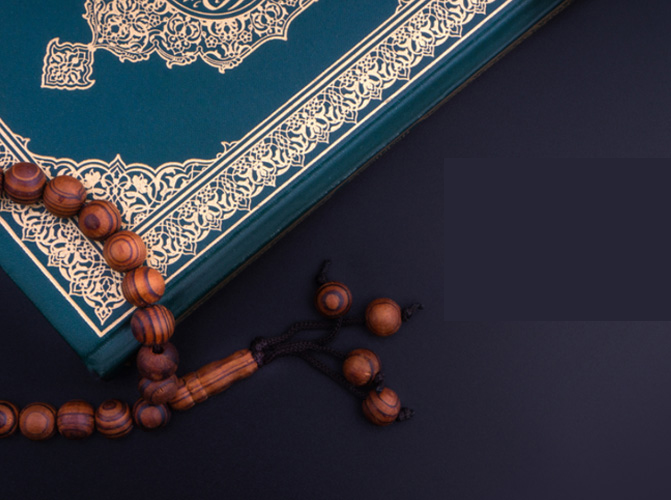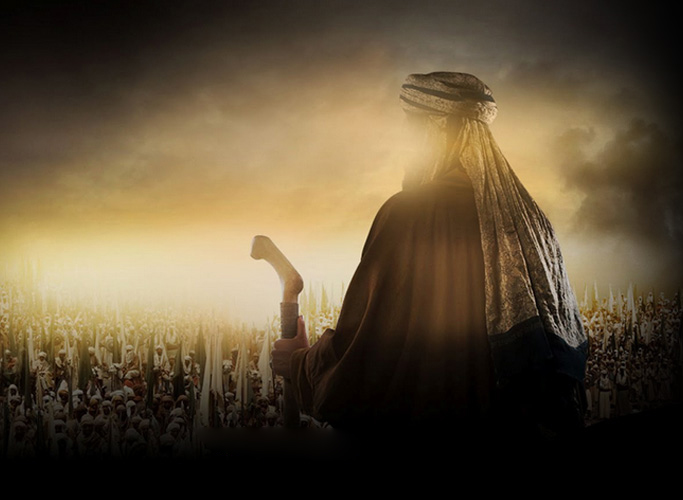Sayyed Ali al-Khamenei, May Allah reserve him, says:
“In order to understand the mode of life of the Imams, May Allah’s Peace and Blessings be upon all of them, the philosophy of Imamate should be clarified first. Based on the conception defined according to the school of Ahlu al-Bayt, the Imamate movement led by eleven successive Imams and extended to about two centuries and a half, is actually an extension of Prophet-hood.
Prophet Muhammad is Allah’s apostle sent to demonstrate an entire new program of human relations and style of life. His mission targets all humankind. And in order to fulfill this task, he paid his utmost effort in constant jihad. But in order to achieve the utmost goals of this mission, the mission has to be led by leaders that are considered to be as great as its first and main leader, Prophet Muhammad, and considered as being the closest to him in order to ensure that they are going to bear their tasks with great loyalty; for this will guarantee their success in establishing a solid, stable, and secured ground; these following leaders are surely the Imams. They are the trustees appointed by Prophet Muhammad. By the way, all of Allah’s apostles and prophets have their own trustees and successors.
Then, should the task of any Imam be understood, the prophetic task should be clarified first as it is defined in the Holy Qura’n in Surat al-Hadid, Verse 25:
﴾Certainly We sent our apostles with manifest proofs, and We sent down with them the Book, and the Balance, so that mankind may maintain justice;﴿
This is one of the verses that illustrate the theme of prophet-hood and the task of prophets. The prophets have been sent to build an entire new society, uproot corruption, revolutionize against ignorance and to alleviate their societies. Such a task is well-expressed by Imam Ali in a speech delivered during the beginning of his rule:
‘…until your inferior becomes your superior’
whereas your superior becomes your inferior…’1
‘… Unless I establish justice and restrain oppression.’2
It is then the process of creating a society based upon monotheism, social justice, honoring and freeing man, legal equality; a society in which maltreatment, tyranny, and monopoly are refused whereas education and teaching, thinking and thoughts are all encouraged; and above all, opportunities are being created for qualified people; a society in which the conditions of man’s highness and moving forward are guaranteed.
Allah has sent His apostles for this very reason. This leads to the conclusion that Imamate bears the same task as it is an extension of Prophet-hood. Both Imamate and Prophet-hood follow the same track and aim toward the one ultimate goal: establishing a just and an Islamic society and keeping its right progress well-protected as well.”
Imamate Concept
Sayyed Ali al-Khamenei, May Allah reserve him, chooses to talk specifically about Imam Ali Bin al-Hussein, nicknamed ‘as-Sajjad’, to elaborate the concept of Imamate as saying:
“Observe how Imam as-Sajjad, May Allah’s Peace and Blessings be upon him, makes good use of his attractive style of expression as he says:
‘…Among the first issues you are going to be asked about are the Lord you worship and the Imam you follow…’
Imam ‘as-Sajjad’ is illustrating here the issue of Imamate. All of the Imams consider Imamate as the synonym of authority; there is nothing that differentiates between Imamate and guardianship- although other people may think about different definitions of the term ‘guardianship’; however, to the Imams, both of these two terms mean the same. The term ‘Imam’ means ‘the successor of the Prophet’ and he is the one in charge of guiding people with respect to their religion and their daily life issues.”
The real concept of the term ‘Imam’ was not well-comprehended before the era led by Imam al-Khomeini, as, fortunately, today, the post era of the Islamic Revolution. We now believe in the ‘Imam’ as being the leader of the society; from whom we learn our religion; the one who manages our life; besides that, and accordingly it is our duty to obey him.
Even within the Shiite world, the role of ‘Imam’ had been sometimes misunderstood. Previously, people thought that the ‘Imam’ has to manage every single issue by himself, by his own effort; according to such thinking, the ‘Imam’ is the decision maker in peace and war, in ordaining grace or banning taboo, as well as in making the complete religious reforms of the people.
Another misconception within the Islamic society is the one that considers Imam al-Mahdi, Peace be upon him, as no more than a religious man living his occultation. This is a mere wrong reading of the term of ‘Imam’. The Imam is the one who leads and the one who proceeds. Imam al-Sadiq, Peace be upon him, had once declared during Hajj time while pilgrims were gathering in Mina and Arafat: ‘Oh, people, Prophet Muhammad has been the Imam.’ Imam al-Sadiq is appointing here to the fact that the Prophet/ the Imam is the one who manages people’s issues related to both their earth life and afterlife, as well. This meaning was not well-absorbed by Islamic societies during ‘Abed al-Malik Bin Marwan’, for example. ‘Bin Marwan’ was the ruler during the time of Imam al-Sajjad, Peace be upon him, and because ‘Imamate’, which means managing people’s life, was derived away from its real qualified people to others who labeled themselves as ‘Imams’ and were publicly known as so.
‘Yazid’, ‘Abed al-Malik Bin Marwan’ along with his father were publicly entitled as ‘Imams’. They were accepted as ‘leaders’ and ‘rulers’.
Thus, when Imam al-Sadiq, Peace be upon him, declared to the people what they will be asked about in their own graves, he was actually drawing their attention toward some big questions: have they elected the most appropriate and the most righteous Imam? Is the one ruling and leading right now really the ‘Imam’? Has this ruler achieved Allah’s approval? By his words, he was trying to make people more aware of the issue of Imamate; he was also trying to make this issue more sensitive from within their own conscious.”
Both the Prophet and the Imam aim at having Divine government established.
“Prophet Muhammad, Peace be upon him and his Household, fought for the establishment of a righteous government based upon Islamic legislation. After having this system well-established, his effort maintained to keep it well-protected and enduring. This issue must be the main concern of the following Imam(s), as well. Therefore, it is not allowed to be oblivious to this vital issue.”
Imams’ General Mode of Life
“Just like Prophet Muhammad, May Allah’s Peace and Blessings be upon him and his household, the Imams have been usually heading toward the same aim, which is having the Islamic just system established with the same characteristics and on the same track, too; and once this system is built, they try hard to keep it well-protected and enduring.
But what are the prerequisites of the creation of a social system? What are the conditions of keeping this system constantly running? The top requirement is having a guiding or a leading ideology upon which the ruling system will be created. The second requirement is the existence of an executive power capable of leading the nation toward the achievement of the final goal despite any obstacles or ups and downs. Now, it is well known that Islam, the mission that holds its own factors of being eternal and enduring, is itself the ideology of the Imams. This will definitely lead to the overall comprehension of the fact that Ahlu al-Bayt’s mode of life has two inseparable dimensions: the first is related to the ideology while the other is related to the social and executive capability.
So their utmost effort has been first of all concentrating on having the Islamic concepts well-clarified, deeply rooted and widespread. Meanwhile they stay full alert against any deviational or corruptive situations. They also keep the overall Islamic mission updated and corresponding to newly occurring circumstances. Besides that they refresh all Islamic features that have been forgotten due to some conflicting interests of current authorities and revitalize all Qur’an and Prophet’s fundamentals that have intentionally been absent from the public collective memory. In sum, their first concern lies in having the Islamic mission alive, constructive, dynamic and highly-protected.
On the other hand, they try their utmost duly to the surrounding political, social and global circumstances to create the atmosphere that enable them to take a full control over the leadership of the Islamic society as soon as possible; otherwise, they at least make sure that they are paving the way in the long term for the coming Imam(s) or the chief(s) who will continue leading on the same track. This briefing illustrates the headlines of the purified Imams’ purpose for which they lived and martyred.”
Islamic Government is Objective
There’s a big mistake committed by those who think that the Imams were always busy in their worship, turning their back to current affairs, being concerned only in spreading the knowledge of Islam without taking good care of its implementation that will definitely lead to the creation of the Islamic government. They are actually wrong when they think that the Imams have never sought the establishment of such a government.
Sayyed Ali al-Khamenei delivers a broader vision concerning the objectives of Ahlu al-Bayt, May Allah’s Peace and Blessings be upon all of them, as saying:
“What is the meaning of affiliating political confrontation and resisting to the Imams, May Allah’s Peace and Blessings be upon all of them?
Ahlu al-Bayt’s jihad has never been limited to scholar of scientific interests as in presenting debates like other groups including ‘al-Mo’tazilah’ or ‘al-Asha’ra’. Nor has their aim at holding Islamic teaching sessions and meeting been to creating their scholastic theology or jurisprudence. It has been rather higher. There’s a political aim embedded in their confrontation. What is it? It is the establishment of the Islamic supreme government. Establishing the Divine government had been sought by the Imams since the death of Prophet Muhammad3 till the year of 260 Hegira4. There’s no claim that every single Imam had thought about establishing a particular one in his own time, but surely speaking that every one of them had worked for the establishment of the Islamic government in the near or far future.
Hence, establishing the Islamic government has been on the top of the agenda of all of the Imams; however, the exact due time of its establishment may vary from one Imam to another. Despite their distinguishing spiritual rites that aim at the completion and the highness and the closeness of their human spirits to Allah, their overall deeds aim also at establishing the Islamic government. All of their political and teaching activities, in addition to their support of some groups against others, aim at creating the Islamic government.”
* Imams’ Broad Biographies. Edited by: Nūn for translation and writing center. Published: June 2010.
1- Nahj al-Balagha, Speech number 16.
2- Nahj al-Balagha, volume 1, his speech on the day of the War of al-Basrah.
3- The death of Prophet Muhammad, May Allah’s Peace and Blessings be upon him and his household took place in the year eleven of the Hegira calendar.
4- The year of 260 Hegira marks the martyrdom of the eleventh Imam al-Hassan al-Asskari, his martyrdom marks the beginning of the small occultation of his son the twelfth Imam al-Mahdi, May Allah’s Peace and Blessings be upon all of them.




















